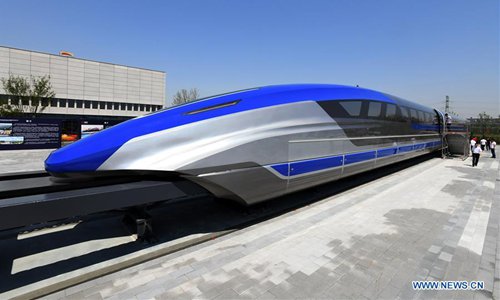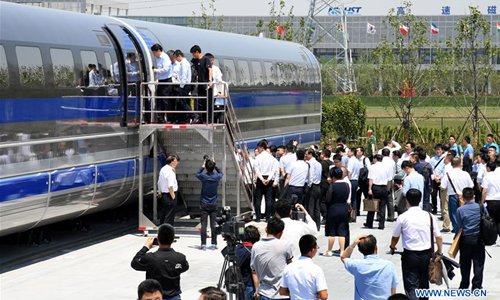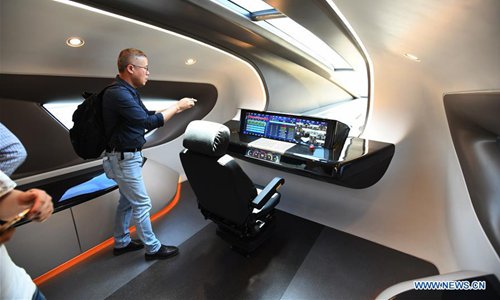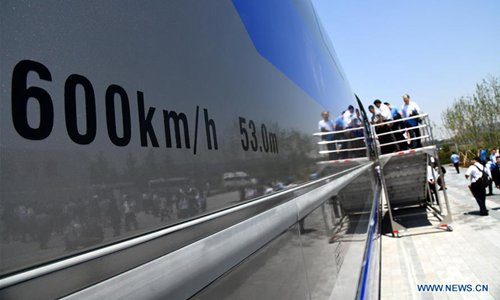China unveils 600 kph maglev train prototype

Photo taken on May 23, 2019 shows China's first high-speed maglev train testing prototype in Qingdao, east China's Shandong Province. China on Thursday rolled off the production line a prototype magnetic-levitation train with a designed top speed of 600 km per hour in the eastern city of Qingdao. The debut of China's first high-speed maglev train testing prototype marks a major breakthrough for the country in the high-speed maglev transit system. The engineering prototype is scheduled to roll off the production line in 2020 and go through comprehensive tests to finish integrated verification in 2021. (Xinhua/Li Ziheng)

Guests visit China's first high-speed maglev train testing prototype in Qingdao, east China's Shandong Province,on May 23, 2019. (Xinhua/Li Ziheng)
China on Thursday rolled off the production line a prototype magnetic-levitation train with a designed top speed of 600 km per hour in the eastern city of Qingdao.
The debut of China's first high-speed maglev train testing prototype marks a major breakthrough for the country in the high-speed maglev transit system.
The testing prototype, which has one car only, can check and optimize the key technologies and core system components of the high-speed maglev system and lay a technological basis for the forthcoming engineering prototype, said Ding Sansan, head of the train's research and development team and deputy chief engineer of CRRC Qingdao Sifang Co., the train builder.
"Now the prototype has achieved static levitation and is in good condition," Ding said.

Guests visit inside of China's first high-speed maglev train testing prototype in Qingdao, east China's Shandong Province,on May 23, 2019. (Xinhua/Li Ziheng)

A guest takes photos inside China's first high-speed maglev train testing prototype in Qingdao, east China's Shandong Province,on May 23, 2019. (Xinhua/Li Ziheng)
The train builder is currently building an experimental center and a trial production center for the high-speed maglev trains and expected to put them into operation in the second half of the year, he said.
The research and development of a five-car engineering prototype are going smoothly.
The engineering prototype is scheduled to roll off the production line in 2020 and finish integrated verification in 2021 after going through comprehensive tests.
The high-speed maglev train can fill the service gap between the current high-speed rail and aviation services and is of great technological and economic significance to improving the country's high-speed passenger transport network. High-speed trains in China now run at a speed of up to 350 km per hour.
CRRC Qingdao Sifang launched a key state-level research and development program with participation of more than 30 companies, universities and research institutes in July 2016 to develop high-speed maglev trains with homegrown intellectual property.

Guests visit China's first high-speed maglev train testing prototype in Qingdao, east China's Shandong Province,on May 23, 2019. (Xinhua/Li Ziheng)
After nearly three years' efforts, the team has made breakthroughs in major core technologies of the high-speed maglev trains and achieved important initial results in the sub-systems, including the locomotive vehicle, traction and operational control communication, said Ding.
High-speed maglev train features high speed, safety, reliability, low noise and vibration, large passenger capacity, on-time performance and low maintenance. It can be used to connect major cities or city clusters to boost regional integration.
Shanghai, China's financial hub, is the only Chinese city operating a commercial high-speed maglev line. The Shanghai Maglev Train using German technology was put in use in 2003 on a 30-km stretch between downtown Shanghai and the city's Pudong airport, with the maximum normal operation speed of 430 km per hour.
Changsha and Beijing offer medium-low-speed maglev rail services using China's self-developed trains.